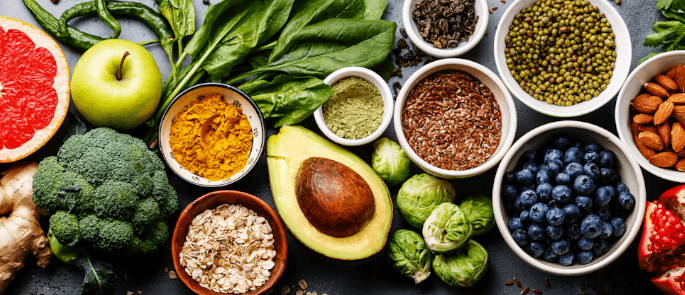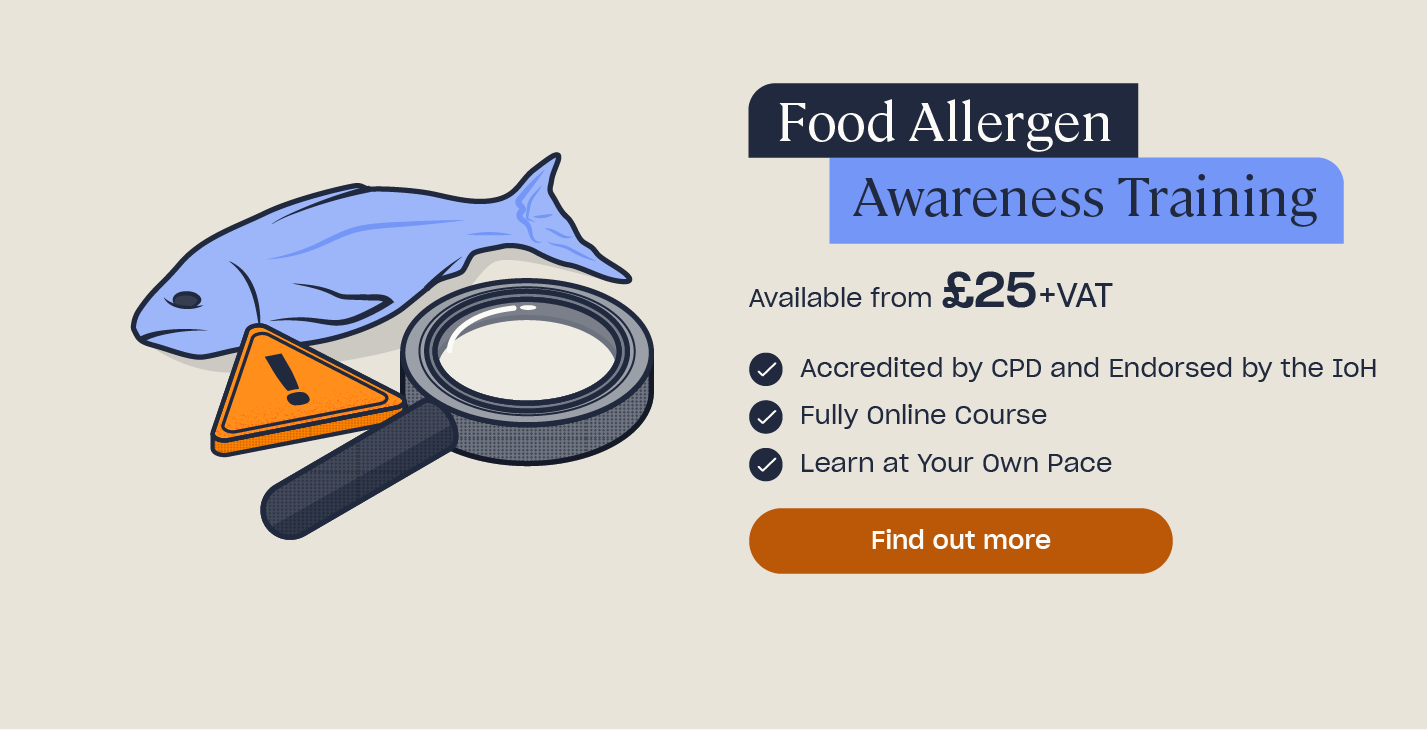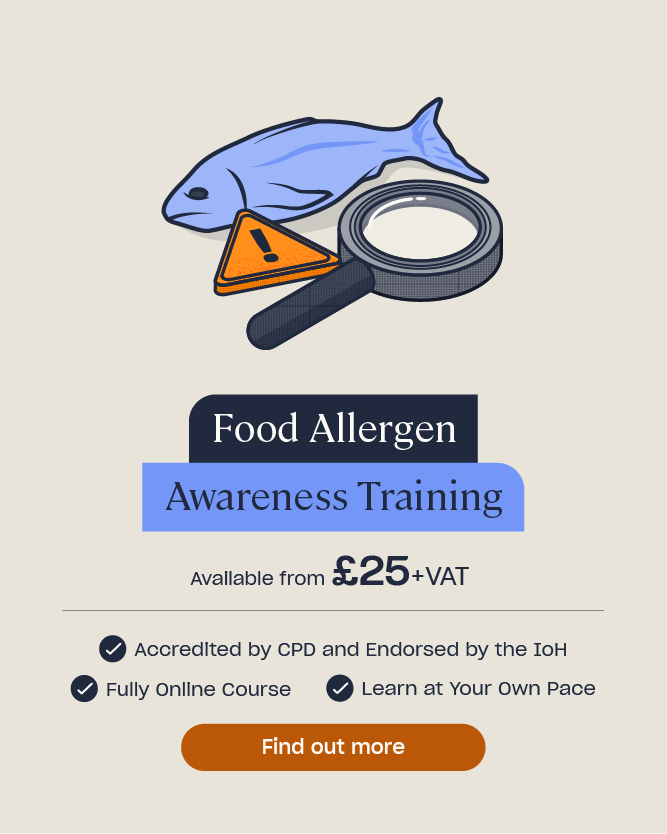Recognising Oral Allergy Syndrome (Pollen Food Syndrome)
A food hypersensitivity is an adverse reaction to food, whether it’s a food allergy, a food intolerance or an autoimmune disease, like coeliac disease. Oral allergy syndrome is a type of food hypersensitivity that can cause your mouth, lips and throat to become irritated when eating certain fruits, vegetables or nuts.
In this article, we’ll look at the importance of being aware of and understanding food allergies and hypersensitivities, the symptoms of oral allergy syndrome and how treatment for this condition can be administered. Whether you suffer from pollen food syndrome yourself, know someone who does or work in the food industry, having an understanding of allergies and their symptoms can be life-saving.

What is Oral Allergy Syndrome?
Oral allergy syndrome, also known as pollen food syndrome, is a hypersensitivity to plant-based foods, such as nuts, seeds, cereals, herbs, fruits and vegetables. If you have oral allergy syndrome, then eating these foods can cause your lips, mouth, tongue and throat to feel irritated or itchy.
Looking to Learn More?
Our article on ’What is Food Hypersensitivity?’ provides further information on this topic.
What Causes Oral Allergy Syndrome?
Pollen food syndrome is fairly common in the UK and, as its name suggests, is linked to hayfever (a sensitivity to pollen). If you’re sensitive to airborne grass, weed or tree pollen in the spring and summer months then you’re more likely to experience oral allergy syndrome, though the two aren’t definitively linked and you can suffer from one and not the other.
The reason hayfever and oral allergy syndrome are often connected is because the protein structure of plant-based foods is very similar to that of tree and grass pollen, causing the immune system to trigger the same response when they are encountered by the body.
There are five main types of pollen that can cause hypersensitivity – silver birch (tree), grass, mugwort (weed), ragweed and latex. It’s typically the nuts, fruits and vegetables associated with each of these that causes oral allergy syndrome.

Oral Allergy Syndrome Foods List
Any plant-based food has the ability to trigger pollen food syndrome, though it’s more likely to elicit a response from the immune system if the food eaten is raw, fresh or in juice or milk form. You may also experience an allergic reaction when preparing plant-based foods, such as when peeling vegetables or chopping herbs.
Did You Know?
Those with oral allergy syndrome can usually eat the problem foods in cooked form because the heating process changes the allergen so that the immune system no longer recognises it as a threat.
There are five main types of pollen that can cause hypersensitivity and it’s often the nuts, fruits and vegetables associated with these that trigger oral allergy syndrome. Foods that commonly cause oral allergy syndrome, and their associated pollen type, include:
| Pollen Type | Fruits This includes whole fruits as well as fruit juices or smoothies. | Vegetables and Herbs This includes vegetables used in juices or smoothies | Nuts This includes whole nuts, chopped nuts and nut milks of any variety. | Seeds, Legumes and Cereals Whether eaten on their own or mixed into salads, etc. |
| Silver birch tree pollen | Apples Apricots Cherries Kiwi fruit Mango Nectarines Oranges Peaches Pears Plums Strawberries Tomatoes | Basil Bean sprouts Carrot Celery Coriander Fennel Green pepper Mangetout Onion Oregano Paprika Parsley Parsnips Peas Potatoes | Almonds Brazil nuts Cashews Hazelnuts Walnuts | Soya beans |
| Grass pollen | Kiwi fruit Melon Oranges Tomatoes Watermelon | Peas Potatoes Swiss chard | Beans Lentils Peanuts Soya beans Wheat | |
| Mugwort and ragweed weed pollens | Apples Banana Melon Oranges Peaches Tomatoes Watermelon | Carrot Celery Chives Coriander Fennel Green pepper Mustard Onions Parsley Parsnip | Aniseed Peanuts Sunflower seeds | |
| Latex | Avocado Banana Kiwi fruit Grapes Lemon Lime Mango Melon Oranges Papaya Passion fruit Peaches Pineapple Plums Tomatoes | Peppers | Chestnuts | Peanuts |

Symptoms of Oral Allergy Syndrome
The symptoms of oral allergy syndrome are similar to those of hayfever and often begin immediately after contact with the plant-based food. Symptoms are usually mild and will calm down within an hour, without the need for medical intervention.
Common symptoms of pollen food syndrome include:
- Itchy lips, mouth, tongue, throat or ears.
- Mild swelling of the lips, tongue or throat.
- Redness around the mouth.
- A runny nose, sneezing and itchy eyes.
More serious symptoms of pollen food syndrome are less common but include:
- Stomach pain or nausea.
- Vomiting.
- Difficulty breathing due an allergic reaction.
If you or someone else experiences these more serious symptoms, then medical help should be sought as soon as possible.

Oral Allergy Syndrome Treatment
Most symptoms of oral allergy syndrome are mild and will subside on their own, without the need for medical treatment. You can ease an itchy mouth or mild swelling by stopping eating the food that’s causing the symptoms and drinking water to wash away any residue left in your mouth. Like hayfever, taking an antihistamine tablet can also help to reduce any discomfort felt within half an hour or so.
If your symptoms don’t improve after an hour, or they seem to be getting worse, then seek medical advice by calling your GP or contacting the NHS on their 111 advice line.

What to do When Having an Allergic Reaction to Food
In rare cases, someone may experience a severe allergic reaction or anaphylactic shock in response to certain foods. In these instances, an ambulance should be called straight away.
If the person knows they have an existing food allergy, then they may carry an auto-injector, such as an EpiPen, Jext Pen or Emerade Pen, in which case you can locate it for them and help them to administer it.
In all situations, if someone is having an allergic reaction to food, you should do your best to reassure them and keep them calm and comfortable until further help arrives.

Looking to Learn More?
Do you work in the food industry and need to understand more about food allergies and how to respond in an emergency? Our Food Allergen Awareness Training will help you develop the knowledge you need to keep your customers safe.
In this article, you’ve learnt about the common causes and symptoms of oral allergy syndrome. Pollen food syndrome triggers a similar response by the immune system as hayfever, so the symptoms are usually mild and can be easily treated at home. We hope you’ve found this article helpful!
Further Resources:











